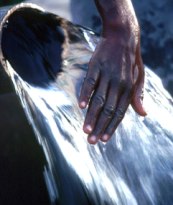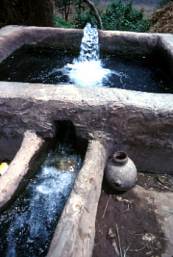As the world observes World Water Day today on March 22, the World Bank is highlighting initiatives that are helping to improve water management in areas ranging from the Aral Sea and the Mekong Delta to the Nile Basin and Lake Victoria. Since the mid-1980s, the Bank has been working on policies and strategies to better manage water resources, integrating the disparate and often competing uses of water (such as for water supply and sanitation, irrigation, hydro-power, industry and ecosystems) into a sustainable, holistic approach.
Since the mid-1980s, the Bank has been working on policies and strategies to better manage water resources, integrating the disparate and often competing uses of water (such as for water supply and sanitation, irrigation, hydro-power, industry and ecosystems) into a sustainable, holistic approach.
The World Bank is investing in the water sector and working together with key private and public sector policymakers and water users to forge innovative partnerships and programs.
Water is receiving increasing attention from the World Bank and other donors as issues of rising demand, declining availability, pollution, and the need for conservation grow in urgency. Since 1993, the Bank has invested $16 billion in water-related projects, with over 180 new operations costing $40 billion in 80 countries. The Bank’s portfolio of water projects accounts for 14 percent of Bank lending. Between 1985 and 1998, the Bank invested more than $33 billion in water-related projects.
The Bank’s Operations Evaluation Department is conducting a major review of the implementation of the Bank’s 1993 Water Resources Management Policy Paper as the Bank prepares to update its approach to the sector.
Collaborating with other development institutions, including multilateral and bilateral development agencies, non-governmental organizations, and the private sector, is an essential aspect of the World Bank’s support for the sector, as is the ability to share knowledge about best practices.
Below is a sampling of recent initiatives, programs, and partnering activities in water-related areas in which the Bank has participated. For more information on each, click here for the full press release.
 Global Water Partnership—Set up in 1996 and with a secretariat based in Stockholm, the Global Water Partnership (GWP) is an international network committed to sustainable water management. To learn more, visit www.gwp.sida.se
Global Water Partnership—Set up in 1996 and with a secretariat based in Stockholm, the Global Water Partnership (GWP) is an international network committed to sustainable water management. To learn more, visit www.gwp.sida.se
World Commission on Dams—The multi-stakeholder, 12-member World Commission on Dams (WCD) was launched in February 1998, and has a two-year mandate to review the development effectiveness of dams and develop internationally acceptable guidelines addressing central issues associated with the wide-spread controversies over dams. For more, visit www.dams.org
World Water Council—Formed in 1996, the World Water Council (WWC) is a 175-member group of leading environmental policymakers, water ministers, scientists, and representatives of international agencies. The WWC is a water policy think tank dedicated to providing decision-makers with the advice and assistance on water issues of global magnitude. To learn more, go to www.worldwatercouncil.org
WBI Water Policy Reform Program—The World Bank Institute, the Bank’s training and teaching arm (formerly known as the Economic Development Institute, or EDI), has a program to help countries prepare and implement policy reforms leading to sustainable water resources management, through capacity building and learning activities of various types. For more, visit www.worldbank.org/html/edi/edien/water.html
UNDP-World Bank Water and Sanitation Program—The Water and Sanitation Program is an international partnership that has evolved over two decades and advocates a demand-based approach to the provision of safe water and sanitation in developing countries. To learn more, visit www.wsp.org
Business Partners for Development (BPD) Water Cluster Initiative—The BPD Water Cluster initiative involves a group of private/public sector/civil society stakeholders who are taking on the challenge of how private concessionaires can provide water and sanitation services to the urban poor in ways that are sustainable as well as commercially viable.
International Watercourses—The Bank is currently supporting cooperation in a number of international basins, including the Aral Sea, the Mekong Basin, Lake Victoria, the Nile and the Senegal River.
Nile Basin Initiative—The Nile Basin Initiative provides a forum for the 10 Nile riparian countries (the nations through which the Nile flows) to foster cooperative Nile waters development and management.
Helpful Links: To see Agence France-Press news coverage of the World Water Commission’s meeting in Cairo tomorrow, visit today’s Development News, the Bank’s daily news summary for the development community.
For more information on the World Bank and its partnerships in water-related areas, call Merrell Tuck in Washington at 202-473-9516 or email mtuckprimdahl@worldbank.org


